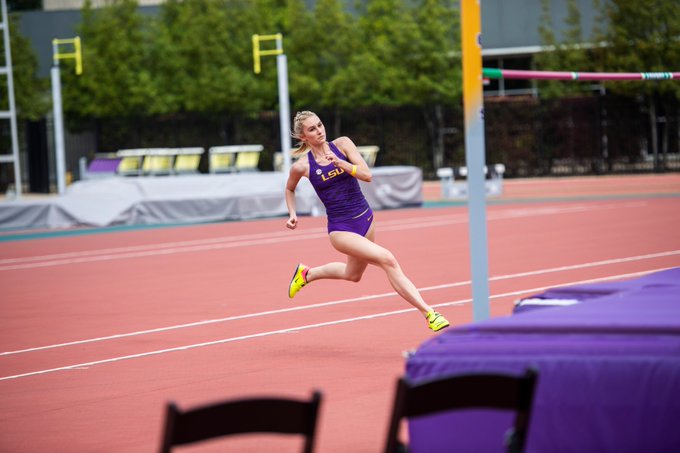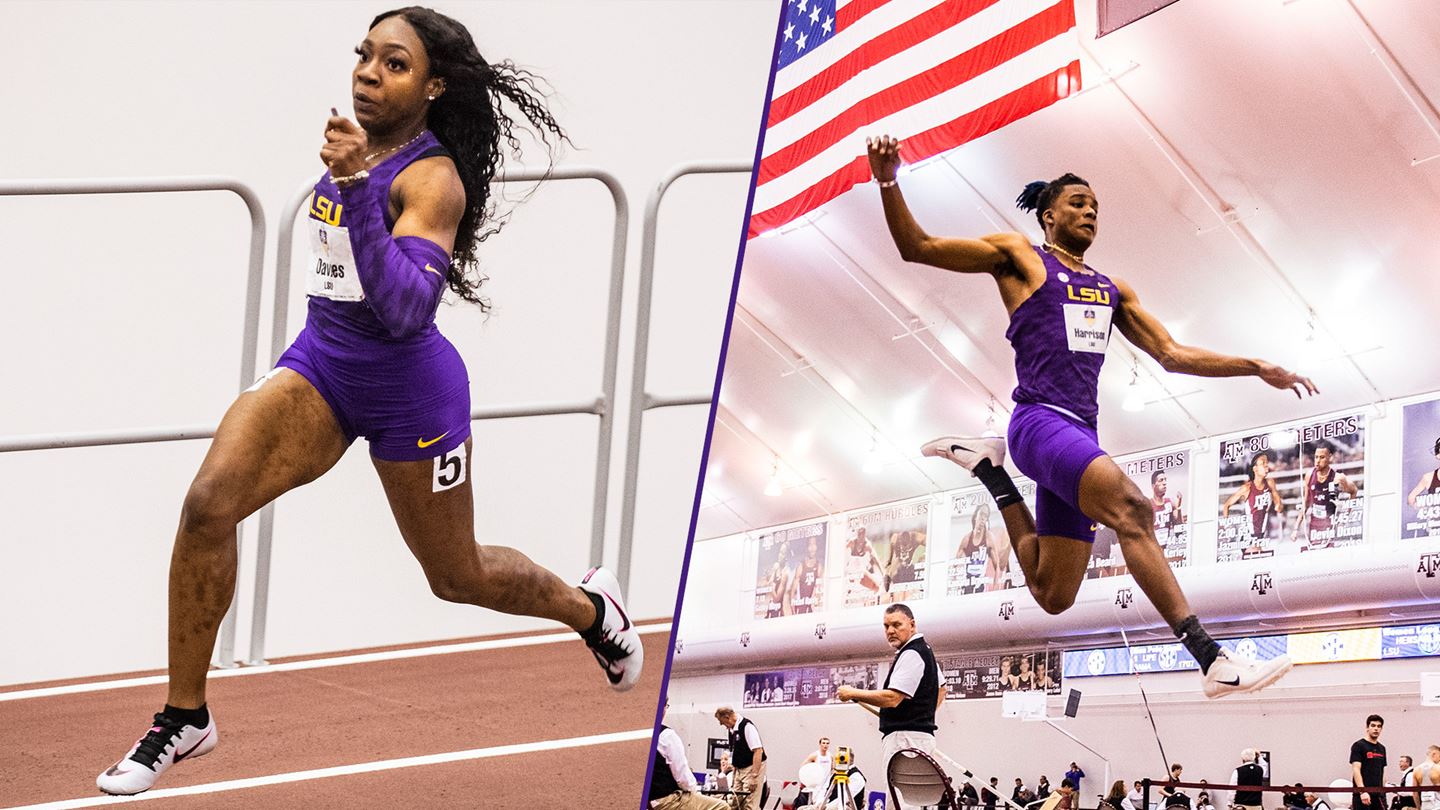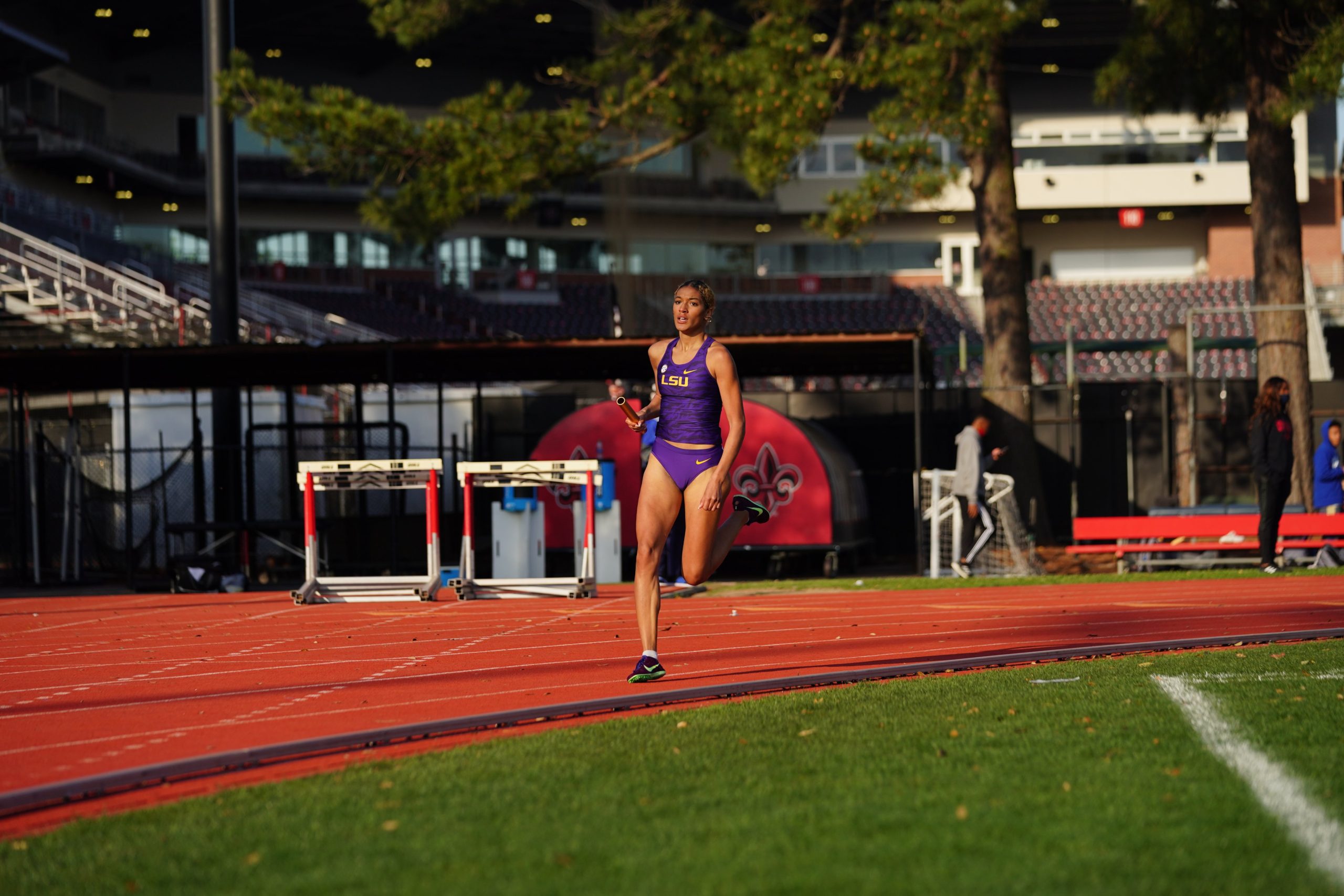
B
The competitive clock ticking inside the head of LSU junior high jumper Abby O’Donoghue indicates she should be embarking on the start of the outdoor track and field season.
Both the nationally ranked LSU men’s and women’s track teams were scheduled to open this weekend in the Baldy Castillo Invitational at Arizona State, mix in a couple of days of spring break, before returning to prepare for the iconic Texas Relays.
O’Donoghue was literally on top of the collegiate track and field world during a sizzling indoor season in which she broke her previous best mark in four consecutive meets, highlighted by a school-record clearance of 6-foot-2 ¼.
Her runner-up showing in the Southeastern Conference indoor meet only fueled her desire to compete in the NCAA Indoor Championships where she believed the No. 1 ranked Lady Tigers were national championship worthy, a development that would serve as a springboard into the outdoor season.
However, all of those hopes and dreams were derailed March 12 when the NCAA announced the cancellation of its Division I winter and spring championships because of the COVID-19 public health threat.
“The team is definitely very upset right now,” said O’Donoghue, a native of nearby Denham Springs. “Coming in ranked No. 1, technically speaking, it’s easy to say we could have won both men and women (championships). We know the situation’s bigger than us. But this is what we’ve worked for and the ultimate goal’s a national championship and we feel it kind of slipped through our fingers. It’s all very upsetting at this point.”
O’Donoghue admits to being an extreme creature of habit.
Her typical 7:30 a.m. wake-up call sets the day in motion, leading to breakfast and class. But that’s given way to mid-morning slumbers past 9:30 and an almost bewilderment to where the days have gone since the SEC’s cancellation of the outdoor season.
“I’m so out of my element,” she said. “I’m still in shock. I don’t know when this is honestly going to kick in. My whole routine’s going to be off.”
O’Donoghue is one of the lucky ones. With an off-campus apartment she shares with a couple of teammates, and living in such close proximity to LSU, O’Donoghue doesn’t have to endure the same edict as either out-of-town or some international team members who have had to vacate their on-campus housing.
Some will return to their respective hometowns and never re-enroll.
Others, if they remain enrolled for the spring semester, will have to conform to the school’s policy and take their classes online.
“It’s crazy how fast this is all happened,” she said. “I think we’re in for a rude awakening next week. We’re not going to know what to do with ourselves.”
LSU athletes are expected to fend for themselves in their respective arenas, trying to make the best out what’s evolved into a coronavirus pandemic.
In attempt to dissuade athletes from utilizing the same facilities they’ve been accustomed to during their careers, access codes and locks have been changed. O’Donoghue and her remaining teammates have been charged with becoming ‘creative’ in their off-campus workouts.
“Coach said to go in the parking lot, go in your backyard and do something,” she said. “You have to stay strong. Continue eating clean, focus and do at-home workouts which I started Sunday which was very weird to me.”
The prospect of spring break is foreign to an athlete so regimented as O’Donoghue that as far back during her spectacular career at Denham Springs High School, she worked at her craft while her friends went off to the beach.
“I’m going to have a lot of free time on my hands and I won’t know what to do with that,” O’Donoghue said. “It’s going to be really weird. I haven’t had a non-track spring break since maybe middle school. It’s going to be very different.”
O’Donoghue entered the season with one clear objective, which was to knock down the literal barrier that the 6-foot bar had become in her mind.
She already held the 2019 SEC indoor title and was tied for fifth on the school’s career indoor list at 5-11 ¼ but made quite a statement in this year’s first indoor meet.
Not only did O’Donoghue win the Purple Tiger Invitational, she did so with a 6-foot 1/2-inch clearance which broke the tie for fifth she shared with mother, Kelli Flynn O’Donoghue (set in 1991), and moved into second place.
O’Donoghue was just getting started. She cleared the 6-foot mark (6-0 ¾) the following two weeks, before soaring 6-2 ¼ to become the school’s record holder which eclipsed the 27-year-old record (6-1 ½) of Gail Kapernick.
Moreover, O’Donoghue became the NCAA’s No. 1 high jumper and the 6-2 ¼ mark also made her eligible for this summer’s U.S. Olympic Trials.
O’Donoghue, who waged a back-and-forth duel with Kentucky’s Ellen Ekholm throughout the indoor season, was edged out by Ekholm for the nation’s top jump (6-3 ¼ to 6-2) at the SEC Indoor Championships. That was expected to set the stage for what O’Donoghue believed would be a precursor for the NCAA Indoor meet and subsequent outdoor season.
“At (the) SEC’s, it hurt to get second but I’m proud of how I performed,” O’Donoghue said. “I have to give it to Ellen; I have to respect that. I was going off that momentum and there was still stuff that I was working on.
“I was excited to compete this past weekend, to show what I’ve been working on and do it in an actual meet because I felt really good.”
O’Donoghue was equally disappointed at the lost opportunity LSU found itself with after coach Dennis Shaver informed his teams of the NCAA’s decision to cancel the national championship indoor meet.
The more Shaver talked, the more O’Donoghue started to gain perspective upon learning the NCAA had also cancelled both its men’s and women’s basketball tournaments on the heels of the NBA putting the brakes on its regular season.
“You have to think how this is a bigger movement than us, this a global health issue,” she said. “That helped us rationalize what’s going on.”
But given the heights she had reached this year and the lengths LSU’s team had advanced, it’s been difficult for O’Donoghue to get past what might have been and gain complete solace.
O’Donoghue’s heard talk of all spring sports athletes gaining an additional year of eligibility, something that may spur her to complete her master’s degree in Mass Communications by the time her eligibility expires.
Thoughts of competing in the U.S. Olympic Trials June 19-28 in Eugene, Ore. – an event that remains scheduled to qualify for the 2020 Tokyo Olympics – has struck a chord with O’Donoghue. But without a consistent training regime and outdoor season to help her adequately prepare, she has a sinking feeling that another potential opportunity of a lifetime could vanish.
“I went from a PR of 5-11 to 6-2 ¼, I never thought I would qualify for the Olympic Trials,” O’Donoghue said. “This makes this more upsetting to think this may not be held and four years later, am I going to still work for this? Training’s important and you’re stressed about where to practice. That’s on my mind as well. It’s just crazy. It’s still very shocking.”




Ya’ll are very fortunate to get Will as part of your organization.